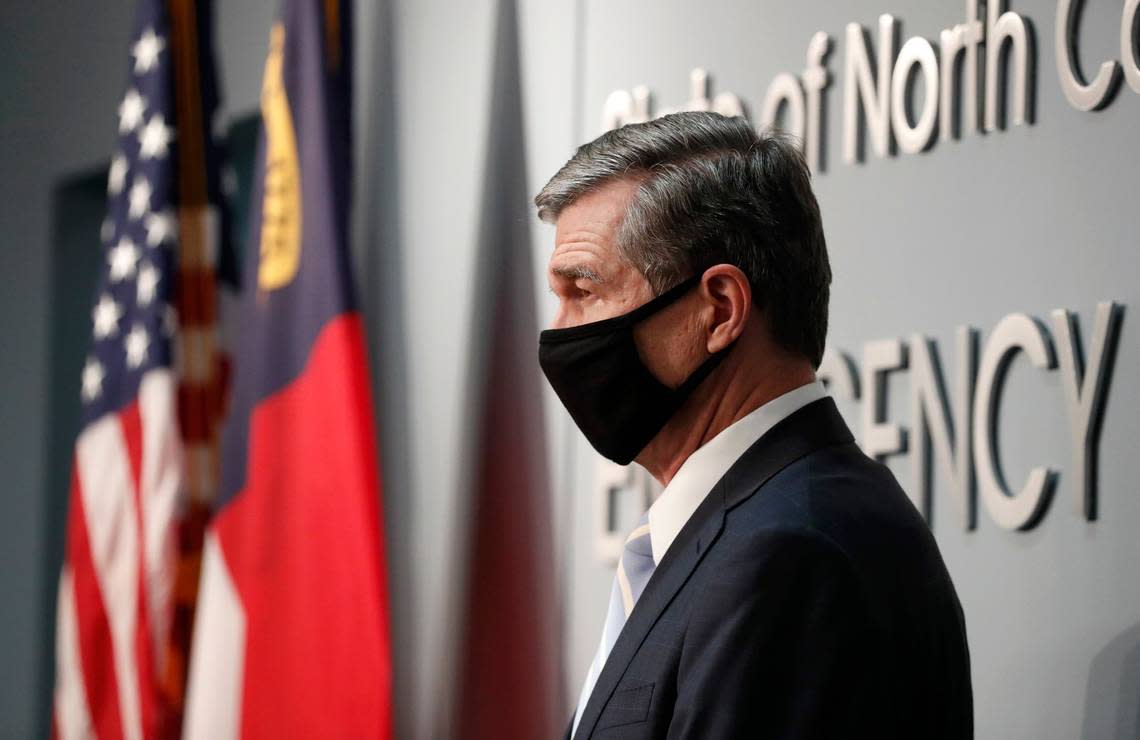New state law starting Jan. 1 will limit NC governor’s powers during an emergency
A new North Carolina state law taking effect the first day of 2023 will limit the governor’s powers.
The law came in response to Democratic Gov. Roy Cooper’s handling of COVID-19 restrictions during the pandemic. Written by the Republican-majority General Assembly, it was part of the state budget bill Cooper signed into law in late 2021.
The law changes how often governors declaring states of emergency will need to get agreement from the rest of the statewide elected officials on the Council of State, and when they will need to consult the General Assembly.
Here’s what you need to know.
Why the law starts in 2023
The new law makes changes to the Emergency Management Act.
After showing up several times in vetoed bills, the changes became law as part of Senate Bill 105, the 2021 state budget. Cooper signed the budget into law in November 2021, but the changes to emergency powers were not set to become law until Jan. 1, 2023.
In 2020, Cooper’s response to the coronavirus pandemic included restrictions on when people could leave home, go to school, shop, dine at restaurants and bars or go to playgrounds, amusement parks or other places.
As the state of emergency continued for more than two years, there were limits on the number of people at events, restrictions on students going to school in person and a mask mandate.
Republican legislative leaders didn’t want a repeat in the future.
In 2021, Rep. Timothy Moffitt, a Hendersonville Republican, said the governor had to “shoulder all the responsibilities” during the coronavirus state of emergency, “and I don’t think that’s an appropriate act for one person to shoulder. We have a Council of State.”
By July 2021, statewide restrictions had lifted, while some local governments put mask requirements in place. Cooper eventually lifted the COVID-19 state of emergency in August 2022, two-and-a-half years after he declared it.
Throughout the era of restrictions, Republican lawmakers pushed back against Cooper’s orders, especially those that limited businesses from operating at full capacity. Cooper vetoed all the bills legislators passed, but during the drawn-out 2021 budget process, Republicans pushed for something that would prevent Cooper or another governor from instilling the same restrictions for as long as he did without agreement from the rest of the Council of State and the General Assembly. Hence, the policy provision in the budget.
When Cooper signed the budget bill into law in November 2021, which was already five months into the new fiscal year, he said that the “good outweighs the bad.” Cooper also said at the time that the 2023 start date for changes to the emergency powers law gave time to prepare for them.
Concurrence of the Council of State
The new law changes how the other nine members of the Council of State are consulted for their agreement, or concurrence, and how their responses are recorded. Members of the Council of State are the lieutenant governor, attorney general, secretary of state, auditor, treasurer, superintendent of public instruction, agriculture commissioner, labor commissioner and insurance commissioner.
The procedure for responses became controversial after an early pandemic order restricting restaurants, in which Council of State members were asked for concurrence via email.
What the law now requires: “The consensus, within 48 hours of contact, of a majority of the Council of State prior to the Governor exercising a power or authority requiring a concurrence of the Council of State. The Governor shall document the contact and response of each Council of State member and shall release the concurrence, nonconcurrence, or no response provided by each member by name and position on the same website in which the executive order is published.”
The law goes on to say that if a Council of State member does not respond within 48 hours, their vote is deemed a concurrence.

When and how states of emergency will expire
The new law describes a statewide emergency area as any emergency area that is applied to two-thirds or more counties.
It also changes how long a state of emergency can be in place.
A state of emergency would expire after 30 days without agreement from a majority of the Council of State. With agreement from the council to extend it, the state of emergency would expire after 60 calendar days, unless the General Assembly extends it through a law.
If the General Assembly does not extend it, the governor “shall not issue a substantially similar declaration of emergency arising from the same events that formed the basis to issue the initial declaration of emergency that was not extended.”
In other words, there’s no way to go around the legislature. The same goes for the Council of State: The law says if the council does not agree to continue an emergency declaration, the governor cannot issue the same or a substantially similar declaration based on the same emergency.
